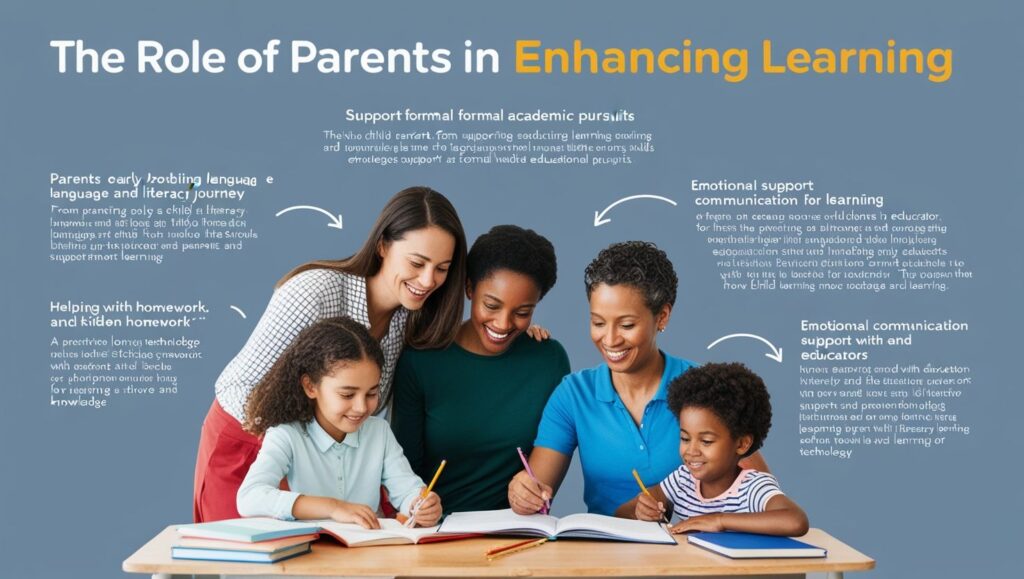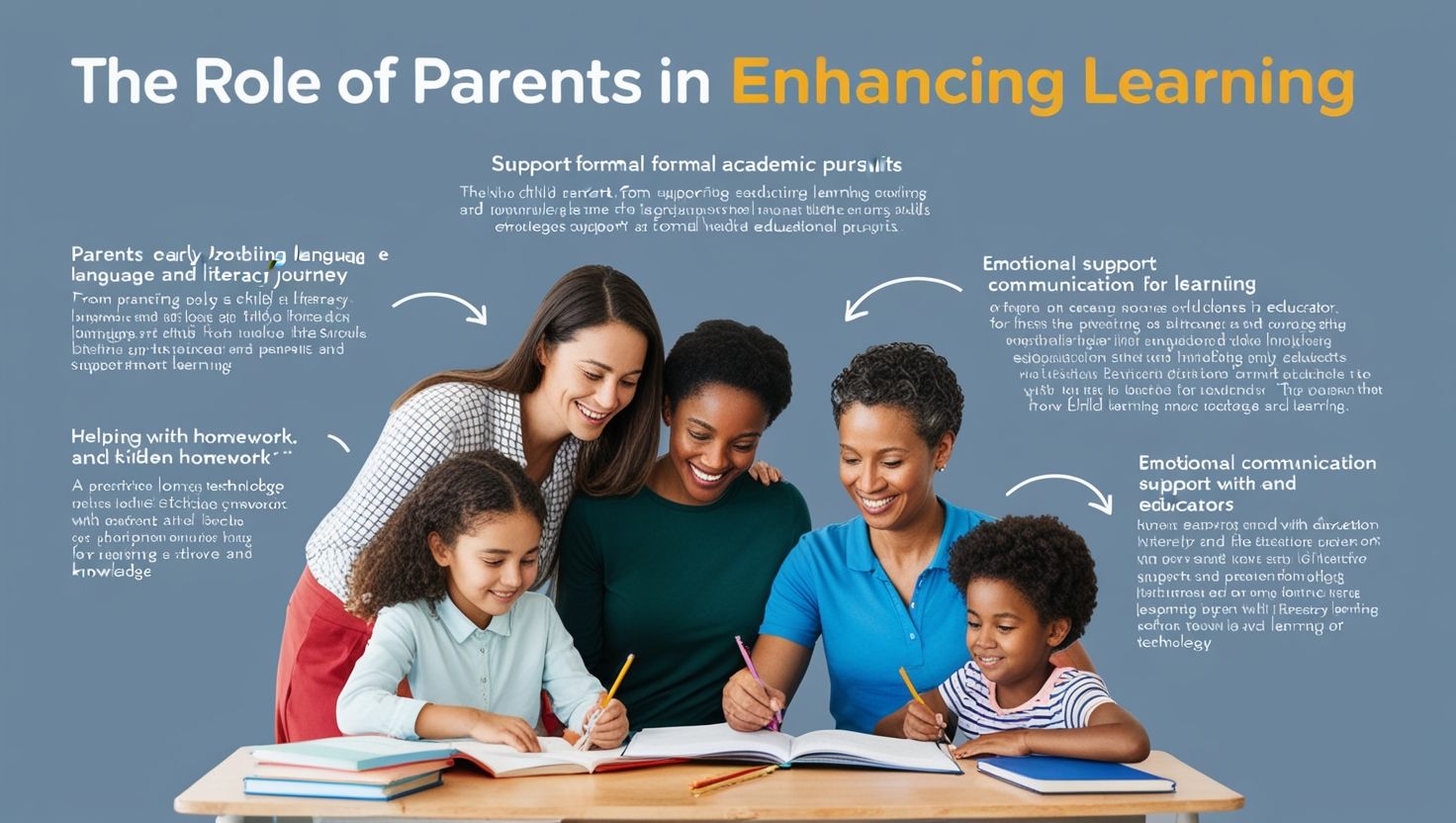Introduction
The Role of Parents in Enhancing Learning, The influence of parents in a child’s educational journey is profound. From early childhood through adolescence, parents provide the essential guidance, support, and encouragement that shape their children’s academic and personal growth. Learning extends far beyond the walls of a classroom, and parental involvement is essential for nurturing a child’s curiosity, resilience, and commitment to lifelong learning. Studies indicate that students with engaged parents often perform better academically, possess stronger social skills, and have a healthier outlook toward challenges (Epstein, 2001). This article explores how parents contribute to learning at various stages of development, from foundational early learning to support for academic, emotional, and social success.
1. Parental Involvement in Early Childhood Education
In early childhood, parents lay the groundwork for a lifetime of learning. Research highlights that parental involvement at this stage has a lasting impact on cognitive, emotional, and social development. Activities such as reading aloud, storytelling, and interactive play are crucial for building language and literacy skills, encouraging curiosity, and developing a child’s problem-solving abilities (Sylva et al., 2004). For example, reading to a child improves vocabulary, enhances comprehension, and fosters a love for books.
Parents who actively engage in their children’s early learning activities create a supportive environment for growth and help instill confidence. Children who experience high levels of parental involvement during early childhood tend to develop a strong foundation for literacy and numeracy, which can lead to better academic performance in later years. Studies also reveal that children who receive early parental support are more likely to display positive attitudes toward learning and classroom engagement (Melhuish et al., 2008). Thus, early parental involvement not only strengthens academic outcomes but also encourages a lifelong love for learning.
2. Supporting Formal Academic Learning
Parents’ involvement in formal education is essential as children progress into elementary and secondary schooling. Active parental engagement, including homework assistance, attending school events, and fostering routines, is associated with higher academic achievement and positive attitudes toward learning (Harris & Goodall, 2008). Establishing a structured routine at home promotes discipline and helps children manage their academic responsibilities effectively.
Research on the impact of parental involvement in schools reveals that students with engaged parents perform better academically, show greater motivation, and have a lower risk of dropping out. According to Hoover-Dempsey and Sandler’s model of parental involvement, children are positively impacted when parents maintain realistic expectations, emphasize the importance of learning, and provide consistent support (Hoover-Dempsey et al., 2005). Parents who encourage goal-setting and support their children’s academic aspirations foster resilience and a growth mindset, both of which are crucial for overcoming academic challenges.
3. Modeling Positive Learning Behaviors
Parents influence their children’s attitudes toward learning by modeling positive behaviors and mindsets. Children who observe their parents reading, engaging in discussions, or learning new skills are more likely to adopt similar attitudes toward knowledge and intellectual curiosity. The social learning theory posits that children often imitate the behaviors of their parents and other significant adults in their lives (Bandura, 1977). This modeling effect can be seen in various ways, from a child’s inclination to read in their free time to their willingness to engage in educational activities beyond the classroom.
Furthermore, when parents demonstrate a positive attitude toward learning, children learn to see education as a rewarding pursuit rather than a compulsory activity. Parents who show enthusiasm for knowledge and curiosity foster an intrinsic motivation in their children, encouraging them to explore topics independently and pursue their interests with dedication. Such behaviors, when internalized, can drive a child’s lifelong learning habits, ultimately contributing to their academic and personal success.

4. Providing Emotional and Social Support
In addition to academic support, parents play a vital role in providing emotional stability and social guidance. Children’s learning is influenced significantly by their emotional well-being, and a supportive home environment helps them build resilience, cope with setbacks, and develop healthy self-esteem. Parental encouragement, patience, and open communication foster a safe space where children feel valued and motivated to express themselves.
Research suggests that children who receive emotional support from their parents are better equipped to handle academic pressures and social challenges. Such children tend to be more self-confident, collaborative, and empathetic—traits that facilitate both academic and social success (Wentzel, 1998). By helping children develop emotional intelligence, parents enable them to navigate complex social situations and contribute positively in classroom environments.
5. Communicating and Collaborating with Educators
Effective communication between parents and educators is another crucial aspect of parental involvement. This collaboration ensures that parents are informed about their child’s progress, needs, and areas for improvement. It also enables parents to provide targeted support at home. Regular communication with teachers allows parents to remain engaged in their child’s educational journey and fosters a cohesive approach to learning (Epstein, 2001).
Parents who actively participate in parent-teacher conferences, volunteer at school events, or engage in community learning initiatives show their children the value of collaboration and shared responsibility. Additionally, consistent communication with educators allows parents to address any behavioral or academic concerns early on, thereby preventing potential challenges from escalating. This partnership approach between parents and educators creates a support system that benefits students and enhances their learning experience.
6. Adapting to a Changing Educational Landscape
The landscape of education has evolved significantly in recent years, particularly with the rise of technology and online learning. Parents now play a key role in helping children navigate digital tools, manage online learning environments, and cultivate digital literacy skills. Research highlights that parental guidance in using digital platforms is crucial for safe, effective online learning, especially when children are exposed to the internet from a young age (Livingstone & Helsper, 2008).
With the shift to digital education, parents are also tasked with teaching children to manage screen time, avoid online distractions, and practice safe online behavior. By setting boundaries, monitoring online activity, and teaching critical thinking skills, parents help children use digital resources responsibly. This guidance is essential in preparing children for a future where digital literacy will be indispensable.
Conclusion
Parents hold a pivotal role in shaping their children’s educational and personal development. From fostering a love of learning in early childhood to supporting academic pursuits, modeling positive attitudes, and providing emotional guidance, parental involvement is instrumental to a child’s success. As education evolves, so too does the role of parents, who must adapt to new challenges, especially in guiding children through the digital world.
Ultimately, parental involvement cultivates a supportive environment for lifelong learning, academic achievement, and emotional resilience. By actively participating in their children’s education, parents lay the groundwork for their children’s success, enabling them to become confident, knowledgeable, and engaged members of society. As research continues to underscore the importance of parental influence, it becomes clear that parents are indispensable partners in the journey of learning and growth.
References
- Bandura, A. (1977). Social Learning Theory. Englewood Cliffs, NJ: Prentice Hall.
- Epstein, J. L. (2001). School, Family, and Community Partnerships: Preparing Educators and Improving Schools. Boulder, CO: Westview Press.
- Harris, A., & Goodall, J. (2008). Do parents know they matter? Engaging all parents in learning. Educational Research, 50(3), 277-289.
- Hoover-Dempsey, K. V., et al. (2005). Why Do Parents Become Involved? Research Findings and Implications. The Elementary School Journal, 106(2), 105-130.
- Livingstone, S., & Helsper, E. (2008). Parental mediation and children’s internet use. Journal of Broadcasting & Electronic Media, 52(4), 581-599.
- Sylva, K., Melhuish, E., Sammons, P., Siraj-Blatchford, I., & Taggart, B. (2004). The Effective Provision of Pre-School Education (EPPE) Project: Final Report. Institute of Education, University of London.

5 thoughts on “The Role of Parents in Enhancing Learning”
Comments are closed.